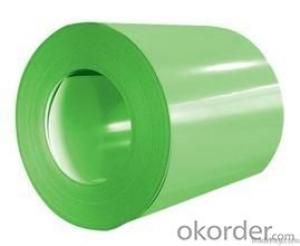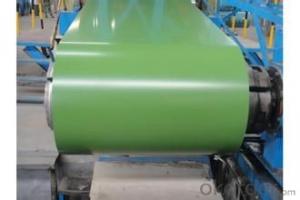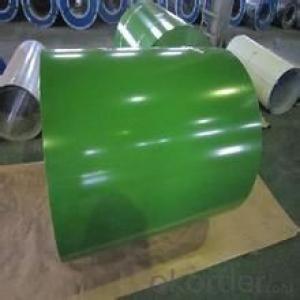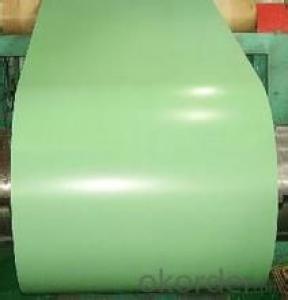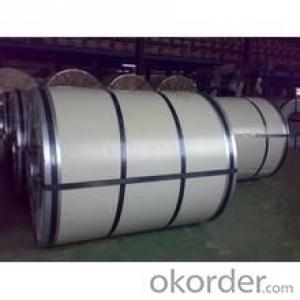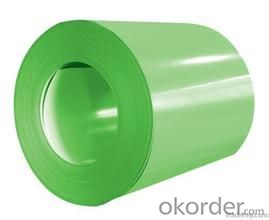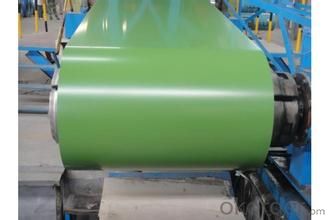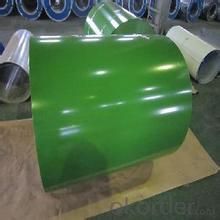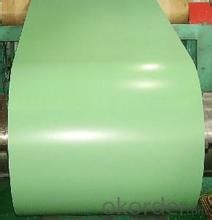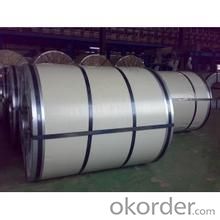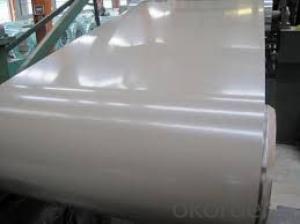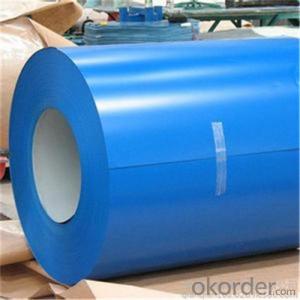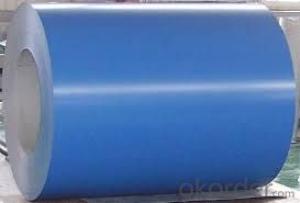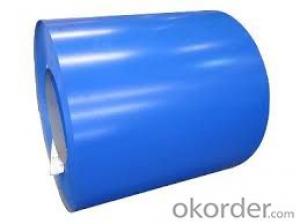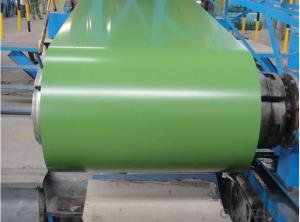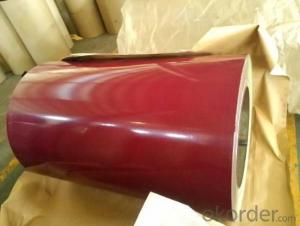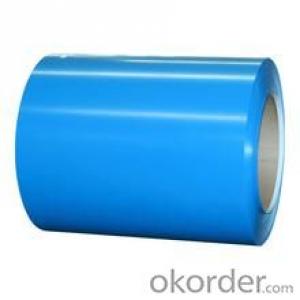Prepainted Galvanized Rolled Steel Coil - from China
- Loading Port:
- Tianjin
- Payment Terms:
- TT OR LC
- Min Order Qty:
- 100 m.t.
- Supply Capability:
- 500000 m.t./month
OKorder Service Pledge
OKorder Financial Service
You Might Also Like
Brief Introduction
Prepainted Galvanized Steel usually refers to have substrateprocessed with surface processed and coated then(roller coated )or bonded organic thin film and baked, and it is able to be processed tofinal prodevtion .
PrepaintedGalvanized Steel qualified with excellent decorative ,formability ,corrosionresistance ,coating adhesion ,can keep for a long time as well as maintainfresh color .For color coated steel sheet can obtain good economicbenefit by steel belt wood ,efficient in construction and save energy ,preventpollution etc.Which is an ideal material;for manufacturing board.
Sample Charge
1.Samples charge:According to your requirements . Sampling time:30days with minimum qty order.
2.Samples charge:Free for Existing Samples Sampling time:1day
Advantage
1. Low MOQ: We will do our best to make you satisfied.
2.Good Service : We treat clients as friend.
3.Good Quality :We have strict quality control system .Good reputation in the market.
4.Fast & Cheap Delivery: We have big discount from forwarder (Long Contract).
5.Supply Ability: 50000 ton monthly
Specifications OfPrepainted Galvanized Steel
Thickness 0.20-1.2mm (BMT) Width 600-1250mm |
Zinc Coating 100-275g/m2 |
Color According to RAL color fan or as per request |
Internal Diameter 508mm or 610mm |
Coil Weight 3-6MT |
Quality Commercial and structural quality |
Paint Polyester paint for topside, epoxy for reverse |
Standard JIS G 3312, ASTM A755M, EN 10169 |
Base Steel Grade SGCC,SGCD,DX51D+Z,DX52D+Z;S200GD,S220GD,S280GD,S350GD,CS,FS,SS |
Chemical Composition Of Prepainted Galvanized Steel
C | Si | Mn | P |
0.04-0.06% | 0.01-0.03% | 0.18-0.22% | 0.014-0.016% |
Technical Data Of Prepainted Galvanized Steel
Yield Strength | (Mpa) 280-320 |
Tensile Strength | (Mpa) 340-390 |
Elongation | 20%-30% |
Reverse Impact | 9J |
T-bending | ≥2T |
Pencil Hardness | ≥2H |
Duration Of Salt Spray Test | 500 H |
Bending At 180 Degree | No crack, purling and fraction |
Applications OfPrepainted Galvanized Steel
It can be widely used in transportation, light industry, civil usage and farming. It is also the perfect building material in construction for making steel roofing,insulation panel, corrugate sheet, facade wall,shutters,T-bar and home appliance.
Packaging & Delivery Of Prepainted Galvanized Steel
The packing of coils consists of anti-damp paper, PVC film, hardboard paper, steel box, strapped with steel strips, fitted with locks and edge protectors and guarantees the optimal condition of the delivered goods. Each coil can be additionally fitted with wooden/steel skids(eye to the side) or wooden pallets(eye to the sky).
General Order Information
We take great pride in our work and in the wide variety of products that we offer. We are
experienced in servicing the Middle East market, South America market and Africa market .
Please be aware thatour production lead times depend on specific items and item quantities.
Our success has been basedon our understanding of the demands and nature of marketing deadlines.
That'swhy we always ensure that every order is delivered on time.
- Q: How are steel coils inspected for surface cleanliness after processing?
- Steel coils are inspected for surface cleanliness after processing through visual examination, using techniques such as optical scanning or high-resolution cameras. Additionally, other methods like acid etching or solvent cleaning may be employed to remove any contaminants or residues on the surface to ensure the coils meet the required cleanliness standards.
- Q: How do steel coils contribute to the HVAC ductwork industry?
- Steel coils play a crucial role in the HVAC ductwork industry by providing the necessary material for the fabrication of ducts. These coils, typically made from galvanized steel, offer several key contributions to the industry. Firstly, steel coils are highly durable and long-lasting, making them ideal for constructing HVAC ductwork. They can withstand high temperatures, pressure, and exposure to various environmental elements. This durability ensures that the ducts made from steel coils can efficiently transport air for extended periods without deteriorating or losing their structural integrity. Moreover, steel coils are flexible and malleable, allowing for easy manipulation during the fabrication process. HVAC ductwork often requires customization to fit specific building layouts and designs. Steel coils can be easily cut, bent, and shaped without compromising their strength. This flexibility enables the production of ducts in various sizes, shapes, and configurations to meet the specific requirements of different HVAC systems. Additionally, steel coils provide excellent resistance to corrosion and fire. The galvanized coating on the steel surface acts as a protective layer, preventing rust and corrosion caused by moisture or chemical reactions. This corrosion resistance ensures that the ductwork remains functional and safe for an extended period. Furthermore, steel coils contribute to the HVAC ductwork industry by enhancing energy efficiency. The smooth surface of steel coils reduces air friction and turbulence within the ducts, allowing for smoother airflow and reducing energy loss. This improved energy efficiency translates into cost savings for building owners and occupants, as it reduces the energy consumption required to maintain a comfortable indoor environment. Lastly, steel coils are readily available and cost-effective, making them a popular choice for HVAC ductwork fabrication. The abundance of steel coils in the market ensures a steady supply, allowing for efficient production and installation of ductwork systems. Furthermore, their cost-effectiveness makes them an economical option for both small and large-scale HVAC projects. In conclusion, steel coils contribute significantly to the HVAC ductwork industry by providing a durable, flexible, corrosion-resistant, energy-efficient, and cost-effective material for the fabrication of ducts. Their unique properties ensure the construction of high-quality ductwork systems that effectively and efficiently distribute air in buildings for optimal comfort and functionality.
- Q: Why is steel so important? How does it help us in everyday life?
- steel comes from iron. Iron is a natural resource and is abundent in nature. so being able to turn it into steel means it can be used for alllll sorts of things! from buildings, cars, piping and tubes, to washing machines, appliances and many other things. its used in our everyday life and is a great, strong material.
- Q: doesnt steel rust?
- Stainless steel is regular steel that has had nickel added in the manufacturing process. Because of the nickel it prevents rust.
- Q: How are steel coils used in the manufacturing of electrical appliances?
- Steel coils are used in the manufacturing of electrical appliances as they serve as the core component for transformers and inductors. These coils are wound with copper wire and encased in a steel core to efficiently transfer electrical energy. The steel coils provide stability, durability, and magnetic properties necessary for the proper functioning of electrical appliances.
- Q: What are the applications of stainless steel coils?
- Stainless steel coils have a wide range of applications across various industries due to their unique properties and characteristics. Some of the key applications of stainless steel coils include: 1. Manufacturing industry: Stainless steel coils are extensively used in the manufacturing sector for the production of various products such as automotive parts, kitchen appliances, machinery components, and construction materials. The high corrosion resistance and durability of stainless steel make it an ideal choice for these applications. 2. Construction industry: Stainless steel coils are widely used in the construction industry for applications such as roofing, cladding, structural supports, and reinforcement. The strength, resistance to harsh weather conditions, and aesthetic appeal of stainless steel make it a popular choice in architectural designs. 3. Food processing industry: Stainless steel coils are commonly utilized in the food processing industry for equipment such as food storage tanks, conveyors, and processing machinery. Stainless steel's hygienic properties, resistance to corrosion, and ease of cleaning make it suitable for maintaining the purity and safety of food products. 4. Chemical industry: Stainless steel coils find extensive usage in the chemical industry due to their excellent resistance to corrosion from chemicals and harsh environments. They are used in the production of storage tanks, pipelines, and reactors that handle various chemicals and corrosive substances. 5. Energy industry: Stainless steel coils are widely employed in the energy sector for applications such as power generation, oil and gas exploration, and renewable energy systems. They are used in heat exchangers, turbine components, pipelines, and offshore structures due to their high resistance to corrosion, strength, and longevity. 6. Medical and pharmaceutical industry: Stainless steel coils are commonly used in medical and pharmaceutical applications due to their biocompatibility and resistance to corrosion. They are used in the production of surgical instruments, medical implants, and medical equipment that require sterilization and durability. 7. Automotive industry: Stainless steel coils are utilized in the automotive sector for various components like exhaust systems, fuel tanks, catalytic converters, and structural parts. Stainless steel's high heat resistance, strength, and resistance to corrosion and oxidation make it suitable for these applications. These are just a few examples of the wide range of applications of stainless steel coils. Their versatility, durability, and resistance to corrosion make them indispensable in numerous industries where reliability and longevity are crucial factors.
- Q: How do steel coils affect the quality of finished products?
- Steel coils can greatly impact the quality of finished products in various industries. One of the key ways steel coils affect product quality is through their dimensional accuracy and consistency. When the steel coils are not properly manufactured or have irregular dimensions, it can lead to issues in the production process and result in finished products that do not meet the desired specifications. Furthermore, the surface quality of steel coils is critical in determining the final appearance and performance of the finished products. Coils with surface defects, such as scratches, rust, or unevenness, can negatively impact the aesthetic appeal of the products, making them less desirable to customers. Moreover, these defects can also affect the functionality and durability of the finished products, leading to potential failures or reduced lifespan. The mechanical properties of steel coils also play a vital role in determining the quality of finished products. Coils with inconsistent or inadequate mechanical properties can compromise the strength, toughness, and overall performance of the end products. For example, in industries such as automotive or construction, where strength and reliability are crucial, the use of steel coils with the wrong mechanical properties can lead to safety hazards or structural failures. Additionally, the chemical composition of steel coils can significantly influence the quality of finished products. The presence of impurities or variations in the alloying elements can affect the material's corrosion resistance, weldability, and other essential properties. This, in turn, can impact the longevity and functionality of the final products. In summary, steel coils have a substantial impact on the quality of finished products. Their dimensional accuracy, surface quality, mechanical properties, and chemical composition all contribute to the overall performance, appearance, and durability of the end products. Therefore, it is crucial to ensure that steel coils used in manufacturing processes meet the desired standards to achieve high-quality finished products.
- Q: Which of the two are better for exhaust manifolds, im guessing the stainless steel right?
- I would go with the stainless steel. I know that there was recently a study done that said that the non-stick material is slowly leaking the non-stick coating into your food. There is a problem with the copper and other metal pans as well. Slowly poisoning you throughout the years. As far as the cast iron, I am not totally sure that there are any problems with those. I haven't heard anything about them that is. I do know that cast iron gets hotter and cooks faster than the other metals. I hope I was able to help. Good luck.
- Q: How are steel coils used in the production of industrial shelving?
- Steel coils are used in the production of industrial shelving as they are typically cut and shaped into various components, such as uprights, beams, and braces, which are then assembled to create sturdy and durable shelving units. The coils provide the necessary strength and stability required to support heavy loads and withstand the demands of an industrial environment.
- Q: How are steel coils coated to prevent rust and corrosion?
- Steel coils are coated to prevent rust and corrosion through a process called galvanization, wherein a layer of zinc is applied to the surface. This zinc layer acts as a sacrificial barrier, protecting the steel from exposure to moisture and oxygen, thereby preventing rust and corrosion.
Send your message to us
Prepainted Galvanized Rolled Steel Coil - from China
- Loading Port:
- Tianjin
- Payment Terms:
- TT OR LC
- Min Order Qty:
- 100 m.t.
- Supply Capability:
- 500000 m.t./month
OKorder Service Pledge
OKorder Financial Service
Similar products
Hot products
Hot Searches
Related keywords
